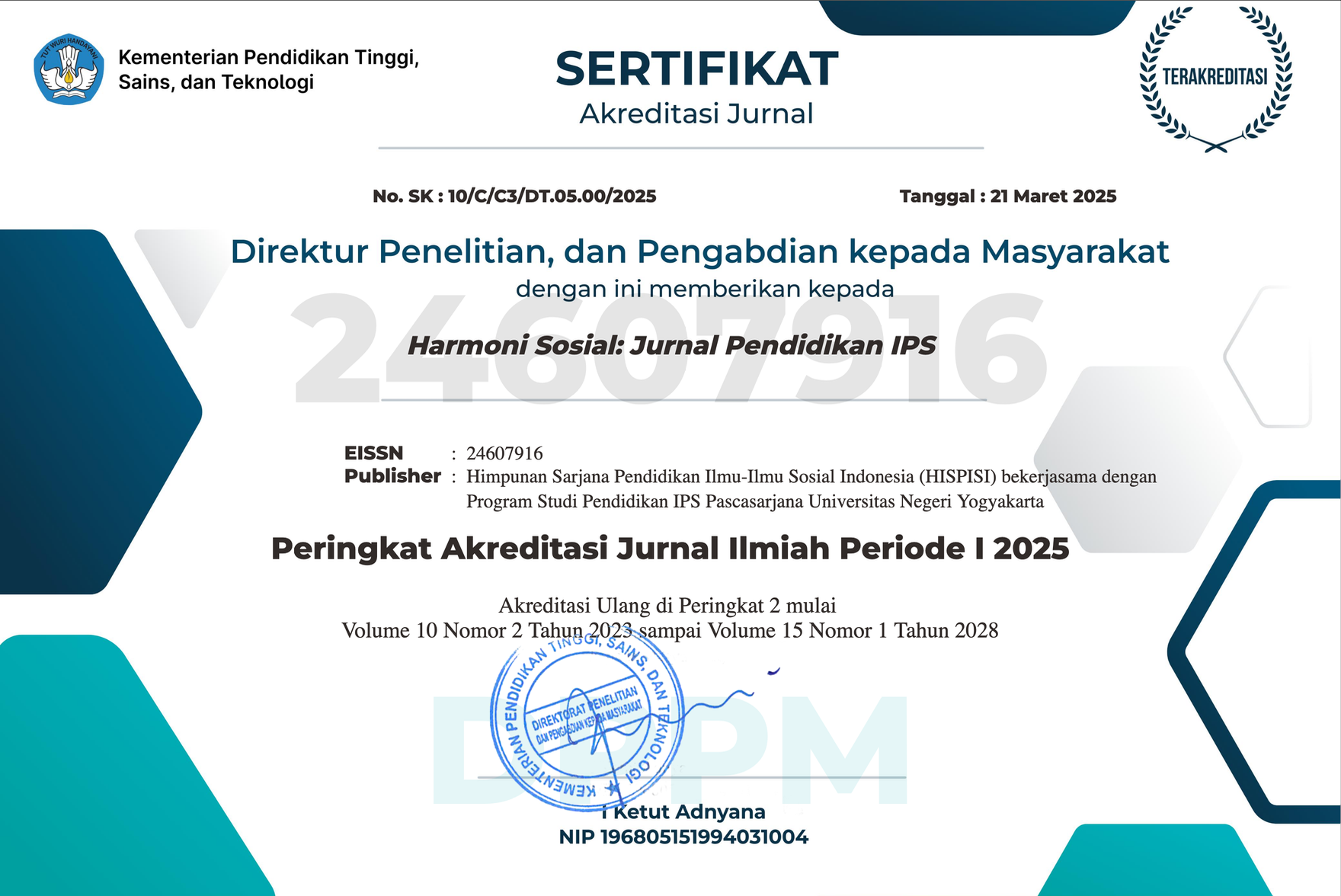Influence of personality, attitude, motivation, and environment on the entrepreneurial spirit of school cooperative teachers in vocational schools in Kulon Progo regency
Downloads
Downloads
Aldrich, H., & Zimmer, C. (1986). Entrepreneurship through social networks. In California Management Review (Vol. 33, pp. 3–23).
Alma, B. (2017). Kewirausahaan untuk mahasiswa dan umum (22nd ed.). Alfabeta.
Amit, E., Rim, S. Y., Halbeisen, G., Cohen Priva, U., Stephan, E., & Trope, Y. (2019). Distance-dependent memory for pictures and words. Journal of Memory and Language, 105(December 2018), 119–130. https://doi.org/10.1016/j.jml.2019.01.001
Badeni, B. (2000). Pendidikan ekonomi dalam membelajarkan dan membina perilaku siswa dalam berkoperasi: Studi kualitatif mengenai partisipasi siswa dalam berkoperasi di SLTA Kodya Bandung [Universitas Pendidikan Indonesia]. http://repository.upi.edu/id/eprint/56578
Bupati Kulon Progo. (2011). Peraturan Daerah Kabupaten Kulon Progo Nomor 11 Tahun 2011 tentang Perlindungan dan Pemberdayaan Pasar Tradisional serta Pusat Perbelanjaan dan Toko Modern.
Chlosta, S., Patzelt, H., Rau, S., & Dormann, C. (2010). Parental role models and the decision to become self-employed: The moderating effect of personality. Small Business Economics, 38, 121–138. https://doi.org/10.1007/s11187-010-9270-y
Collins, C. J., Hanges, P. J., & Locke, E. A. (2004). The relationship of achievement motivation to entrepreneurial behavior: A meta-analysis. Human Performance, 17(1), 95–117. https://doi.org/10.1207/S15327043HUP1701_5
Crant, J. (1996). The proactive personality scale as a predictor of entrepreneurial intention. Journal of Small Business Management, 34(3). https://homepages.se.edu/cvonbergen/files/2013/01/Proactive_Personality-Scale-as-a-Predictor-of-Entrepreneurial-Intentions.pdf
Dalimunte, M. A. (2015). Meng-akselerasi pertumbuhan koperasi melalui pelibatan teknologi informatika. INFORMATIKA, 3(3), 1–8. https://doi.org/10.36987/informatika.v3i3.218
Engle, R., Dimitriadi, N., Gavidia, J., Schlaegel, C., Delanoí«-Gueguen, S., Alvarado, I., He, X., Baume, S., & Wolff, B. (2010). Entrepreneurial intent: A twelve country evaluation of Ajzen's model on planned behavior. International Journal of Entrepreneurial Behaviour and Research, 16, 35–57. https://doi.org/10.1108/13552551011020063
Gadar, K., & Kamal, N. (2009). The influence of personality and socio-economic factors on female entrepreneurship motivations in Malaysia. International Review of Business Research Papers, 149–162. https://citeseerx.ist.psu.edu/viewdoc/download?doi=10.1.1.512.7959&rep=rep1&type=pdf
Gird, A., & Bagraim, J. J. (2008). The theory of planned behaviour as predictor of entrepreneurial intent amongst final-year university students. South African Journal of Psychology, 38(4), 711–724. https://doi.org/10.10520/EJC98508
Gnyawali, D. R., & Fogel, D. S. (1994). Environments for entrepreneurship development: Key dimensions and research implications. Entrepreneurship Theory and Practice, 18(4), 43–62. https://doi.org/10.1177/104225879401800403
Hadi, S. (2001). Analisis regresi (1st ed.). Andi.
Hamilton, B. H., Papageorge, N. W., & Pande, N. (2018). The right stuff? personality and entrepreneurship. National Bureau of Economic Research Working Paper Series, No. 25006. https://doi.org/10.3386/w25006
Klyver, K., Hindle, K., & Meyer, D. (2008). Influence of social network structure on entrepreneurship participation"”A study of 20 national cultures. International Entrepreneurship and Management Journal, 4(3), 331–347. https://doi.org/10.1007/s11365-007-0053-0
Menteri Pendidikan Nasional Republik Indonesia. (2008). Peraturan Menteri Pendidikan Nasional Republik Indonesia Nomor 39 Tahun 2008 tentang Pembinaan Kesiswaan.
Meredith, G. G., Neck, P. A., & Nelson, R. E. (2000). Kewirausahaan teori dan praktek (D. Suseno (Ed.)). Pustaka Binaman Pressindo.
Nurbudiyani, I. (2013). Pengembangan model kewirausahaan SMK melalui koperasi sekolah. Anterior Jurnal, 12(2), 46–53. https://doi.org/10.33084/anterior.v12i2.306
Pemerintah Kabupaten Kulon Progo. (2012). SMKN 1 Nanggulan terima ISO 9001:2008. Kulonprogokab.Go.Id. https://kulonprogokab.go.id/v31/detil/2203/smkn-1-nanggulan-terima-iso-90012008
Presiden Republik Indonesia. (2005). Peraturan Pemerintah Republik Indonesia Nomor 19 Tahun 2005 tentang Standar Nasional Pendidikan.
Puspitawati, H. (2009). Kenakalan pelajar (Dipengaruhi oleh sistem sekolah dan keluarga). IPB PRESS.
Salimath, M. S., & Cullen, J. B. (2010). Formal and informal institutional effects on entrepreneurship: a synthesis of nation"level research. International Journal of Organizational Analysis, 18(3), 358–385. https://doi.org/10.1108/19348831011062175
Sari, D. P. (2013). Efektivitas peran koperasi sekolah sebagai unit pembelajaran kewirausahaan di SMP Negeri 1 Karanganyar Kabupaten Pekalongan. Economic Education Analysis Journal, 2(1), 14–17. https://journal.unnes.ac.id/sju/index.php/eeaj/article/view/1434/1528
Schmitt-Rodermund, E. (2004). Pathways to successful entrepreneurship: Parenting, personality, early entrepreneurial competence, and interests. Journal of Vocational Behavior, 65(3), 498–518. https://doi.org/https://doi.org/10.1016/j.jvb.2003.10.007
Segal, G., Borgia, D., & Schoenfeld, J. (2005). The motivation to become an entrepreneur. International Journal of Entrepreneurial Behavior & Research, 11(1), 42–57. https://doi.org/10.1108/13552550510580834
Shane, S., Locke, E. A., & Collins, C. J. (2003). Entrepreneurial motivation. Human Resource Management Review, 13(2), 257–279. https://doi.org/10.1016/S1053-4822(03)00017-2
Sommer, L. (2011). The theory of planned behaviour and the impact of past behaviour. International Business & Economics Research Journal (IBER), 10(1), 91–110. https://doi.org/10.19030/iber.v10i1.930
Suharti, L., & Sirine, H. (2011). Faktor-faktor yang berpengaruh terhadap niat kewirausahaan (entrepreneurial intention). Profit : Jurnal Penerapan Ilmu Manajemen Dan Kewirausahaan, 13(2), 124–134. https://doi.org/10.9744/jmk.13.2.124-134
Suryana, S. (2008). Kewirausahaan: Pedoman praktis kiat dan proses menuju sukses. Salemba Empat.
ToMiRa, model pemberdayaan UMKM dari Kulon Progo. (2017). Nusakini.Com. https://nusakini.com/news/tomira-model-pemberdayaan-umkm-dari-kulon-progo
Warmanto, F., & Thenu, H. (2009). Analisis hubungan antara sikap, norma subyektif, dan kontrol keperilakuan yang dirasakan terhadap perilaku berbagi pengetahuan manajer: Studi empiris pada perusahaan di wilayah Jakarta. Ultima Management : Jurnal Ilmu Manajemen, 1(1 SE-Articles). https://ejournals.umn.ac.id/index.php/manajemen/article/view/164
Zhao, H., & Seibert, S. (2006). The big five personality dimensions and entrepreneurial status: A meta-analytical review. The Journal of Applied Psychology, 91, 259–271. https://doi.org/10.1037/0021-9010.91.2.259
The Authors submitting a manuscript do so on the understanding that if accepted for publication, copyright publishing of the article shall be assigned to Harmoni Sosial: Jurnal Pendidikan IPS
 | Harmoni Sosial: Jurnal Pendidikan IPS by http://journal.uny.ac.id/index.php/hsjpi is licensed under a Creative Commons Attribution-ShareAlike 4.0 International License. |









 ISSN Print
ISSN Print









